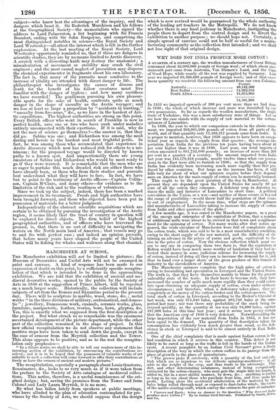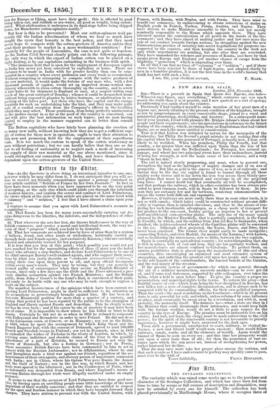WHY DOES NOT INDIA PRODUCE MORE COTTON ? A QUART=
of a century ago, the woollen manufacturers of. Great Britain consumed about 32,000,000 pounds of foreign wool ; of which about one- sixteenth Axtrt came from Australia, Van Diemen's Land, and the Cape of Good Hope, while nearly all the rest was supplied by Germany. Last year we imported 99,300,000 pounds of foreign wool; and of that enor- mous quantity we received the following amount from our own Colonies. Pounds.
Australia 49,142,306 East Indies 14,283,535 South Africa 11,075,965 74,501,806 In 1855 we imported upwards of 200 per cent more than we had done in 1830 ; the whole of which increase and more was furnished by our own possessions. So far as regards the woollen manufacture, the staple trade of Yorkshire, this was a most satisfactory state of things. Let us see how the case stands with the supply of raw material to the cotton. spinners of Lancashire.
In 1830,,. the year to which our comparison extends in the above state- ment, we imported 263,961,000 pounds of cotton from all parts of the world, and of that quantity only 12,483,217 pounds came from India. It is proper to mention, however, that 1830 appears to have been an excep. tional year as regards the supply from that quarter ; the average im- portation from India for the previous ten years having been about 40 per cent higher than it was in 1830. Last year, our total imports of cotton amounted to 891;752;000 pounds ; an increase of more than 260 per cent in a quarter of a century. The amount imported from India last year was 145,179,216 pounds, nearly twelve times what our posses- sions in the East were able to furnish in 1830; so that the supply from India has evidently been increasing much more rapidly than that pro- duced by other countries. But large as the increase has been, it still falls very far short of what our spinners require before their depend- ance on America for the main supply of cotton can be materially lessened.
This ought to be the great question of the day in Manchester. At present they are dependent upon the United States for nearly 80 per cent of all the cotton they consume. A deficient crop in America re- duces the mills and factories of Lancashire to short time. A political convulsion in the Union, or a war—and neither of these events is beyond the range of possibility—would throw half the population of that coun- ty out of employment. In the mean time, what steps are the spinners i and manufacturers of Lancashire taking to increase the supply of cotton from India and other quarters of the globe?
A few months ago, it was stated in the Manchester papers, as a proof of the energy and enterprise of the capitalists of Bolton, that a number
of additional mills were about to be erected in that town and neighbour- hood for the spinning of cotton. Not many weeks after that notice ap- peared, the trade circulars of Manchester were full of complaints about the cotton trade, which was said to be in a most unsatisfactory condition, owing to the short supply of the raw material, and the difficulty of ob- taining an advance in the prices of yarns and goods, equivalent to the rise in the price of cotton. Now the obvious reflection which must oc- cur to any one in comparing these two facts is, that the capitalists of Bolton would have been much more worthy of laudation if they had in- vested their money in some judicious scheme for increasing the supply of cotton, instead of doing all they can to increase the demand for it, and thus to hand over a larger share of the gross produce of this branch of industry to the slaveholders of America. The Manchester spinners complain that the high price of cotton is owing to forestalling and speculation in Liverpool and the United States. The truth is, that they have themselves mainly to blame for the present unhealthy state of the trade. In their haste to become rich, they have increased the number of mills much more rapidly than they could calcu- late upon obtaining an adequate supply of cotton, even under ordinary circumstances ; and therefore, when a deficiency takes place, they are completely at the mercy of the cotton-broker and the cotton-grower. The total stock of cotton in Liverpool, according to the Broker's Circular of last week, was only 371,040 bales, against 482,740 bales at the same period last year; nor was there any probability of the stock being in-
creased speedily, as the quantity at sea was only 94,000 bales' against
187,000 bales at this time last year; and it seems now pretty certain that the American crop of 1856 is very deficient. Notwithstanding the large importation of the raw material from India in 1855, it has not been equal to the demand. The quantity of that description taken for consumption has evidently been much greater than usual, as the defi- ciency in stock at Liverpool is said to be almost entirely in East India cotton.
One of the chief complaints that is made against Indian cotton is the bad condition in which it arrives •in this country. This defect is not likely to be cured so long as the traffic is left in the hands of the Indian ryots. A recent pamphlet by an Indian Civil Servant* gives a lively description of the way in which the cotton suffers in its passage from the place of growth to the place of manufacture.
"The grower picks it carelessly, with a quantity of the leaf and rub- bish which are so injurious to our delicate spinning-machinery : it all adds to the weight of the crop, and thus tends to his advantage. This dirt, and other deteriorating substances, instead of being scrupulously
extracted by the cotton-cleaner who next gets the staple into his hands, 16 added to, but in a more skilful 'manner by dews, ac. : anything is lawful
so long as he can cheat those who purchase from him, and thus make his profit. Letting alone the accidental adulteration of the material by the bales being rolled through mud or exposed to dust-laden winds, the crews of the native coasting-craft, which convey the cotton to the port of embarka-
• Usurers and Ryot : being an Answer to the Question Why does not Indio produce more Cotton F " Bran Indian Civil Servant. Published by Smith, Elder, and Co. tion for Europe orChin must have their profit : this is effected by good being taken out, and rub ish or sea-water, all good as weight, being substi- tute& What adulteration it undergoes in its final stage before being shipped home, let Manchester cotton-spinners testify."
But how is this to be prevented ? Must our cotton-spinners wait pa- tiently till the Indian schoolmasters of whom we hear so much have taught the ryota that honesty is the best policy, and that they need never hope to compete with the cotton-growers of America unless they send their produce to market in a more workmanlike condition ? For- tunately for the people of Lancashire, the case is not quite so hopeless. As the Indian Civil Servant clearly points out in the following passage, the only way in which the export of Indian cotton can be placed on a right footing, is by our capitalists embarking in the business with spirit. "The' immense field that is open for the employment of European capital in India has never yet been conceived by capitalists at home. There are fortunes to be made in India with far greater facility than can be com- manded in a country where every profession and every trade is overstocked. Without competing or attempting to compete with the native producer of the raw material, it would make the fortune of any man who, with a few thousand pounds of capital, would set up improved steam-worked ma- chinery wherewith to clean cotton thoroughly up the country, and to screw it into bales fit for shipment to England at once, at a seaport within easy reach of the great entrepfit of Bombay; whence it could be despatched home without being exposed to plunder by native boatmen, or adulteration in re- packing at the latter port. Let those who have the capital and the energy requisite for such an undertaking take the hint, and they may make quite sure of a cordial reception from the Company's officers in the localities
'
which they may select. Those gentlemen, from being perfectly uninterested in the matter except in so far as the good of the country is concerned, can and will give the best information on such topics ; and no man having capital to employ in the manner suggested can do better than consult them."
The Bolton capitalists who have lately been planning the erection of so many new mills, without knowing how they are to get a sufficient sup- ply of cotton for those now in operation, ought to turn their attention to this new and proinising field for the employment of their superfluous cash. It is too much the custom to speak of the cotton aristocracy as men without patriotism ; but we can hardly belive that they are so far lost to all feeling of nationality as to neglect such a mode of increasing the supply of their raw material as the one above mentioned, since it would strengthen our connexion with India, and leave themselves less dependent upon the cotton-growers of the United States.

































 Previous page
Previous page